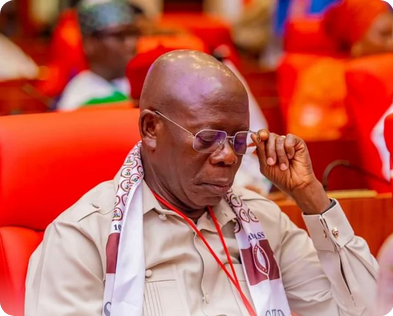
Principal and CEO, Bush Radio Academy In a powerful presentation at the floor of the senate that sent shockwaves across the internet, former Edo State Governor Adams Oshiomhole laid bare the oppressive practices of electricity distribution companies (DisCos) in Nigeria. His analysis not only shed light on the structural failures of the sector but also exposed the hypocrisy and inefficiency that plague these companies....CLICK HERE TO READ THE FULL ARTICLE➤
Oshiomhole questioned the logic of DisCos claiming to incur significant costs while individuals and governments bear the burden of purchasing transformers and funding installations. He highlighted the absurdity of this practice, where privately funded infrastructure is converted into the property of these companies, who then turn around to charge consumers exorbitantly for their services—or lack thereof.
He also pointed out a glaring anomaly: the federal government, a co-owner of these DisCos, has no representation in their governing councils. This governance gap underscores the systemic dysfunctionality of the power sector and raises questions about accountability and oversight.
However, Oshiomhole’s revelations go beyond the power sector; they serve as a metaphor for the broader failures in Nigeria’s governance system. Nigerians are quick to lay blame at the doorstep of the presidency for the country’s woes, yet they often ignore the roles of local and state authorities who have a direct impact on their daily lives. This misplaced aggression allows mediocrity to thrive at lower levels of government, leaving citizens in perpetual suffering.
Take, for example, local government chairmen, who receive huge allocations from the federal government. What do they have to show for it? Similarly, state governors often fail to account for the billions of naira allocated to their states. Meanwhile, legislative representatives, who should be the voice of their constituencies, remain silent or complicit.
The reality is clear: If at least 70 percent of local government chairmen and governors performed even at the level of Nigeria’s worst president, the nation would have surpassed many Western countries in terms of development. Yet, we continue to allow these leaders to escape scrutiny.
Adams Oshiomhole’s presentation is a wake-up call. It reminds us that true leadership is about representing the people and holding systems accountable. Until Nigerians begin to prioritize directing their frustrations towards the appropriate authorities, the cycle of exploitation and underdevelopment will persist.
It is time to start asking the hard questions. What are our local leaders doing with the resources entrusted to them? What tangible contributions are our legislators making towards national and community development? And why do we continue to tolerate governance that serves only the interests of a few?
The time for silence is over. Nigerians must rise and demand accountability from every level of government. Only then can we hope to achieve the progress we so desperately need. ...CLICK HERE TO READ THE FULL ARTICLE➤
Be the first to comment